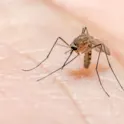
Life sciences
21 Jul 2022
Microbial ´dark matter´: centuries-old lava caves of Hawaiʻi Island contain thousands of unknown bacterial species
By K.E.D. Coan, science writer Thick microbial mats hang under a rock ledge in steam vents that run along the Eastern Rift Zone on Hawaiʻi Island. Image Credit: Jimmy Saw Volcanic habitats in Hawaiʻi are rich in bacterial diversity, including many yet undiscovered species, shows a new study. These lava caves and geothermal vents are similar to what may have once existed on Mars and the bacterial communities that co-exist there provide clues about how life can exist in extreme environments. This work also suggests that there is still much to learn about as-of-yet unknown bacteria here on Earth. The lava caves, lava tubes and geothermal vents on the big island of Hawaiʻi have higher bacterial diversity than scientists expected, reports a new study in Frontiers in Microbiology. These habitats represent how life might have existed on Mars and early Earth in the past, and this study explores the diversity and interactions within these microbial ecosystems. Surprisingly, the results revealed that a group of bacteria called Chloroflexi are often ‘hub’ species, meaning that they are connected with many other species and usually play key ecological roles in the community. Little is known about many Chloroflexi species and further study will […]













